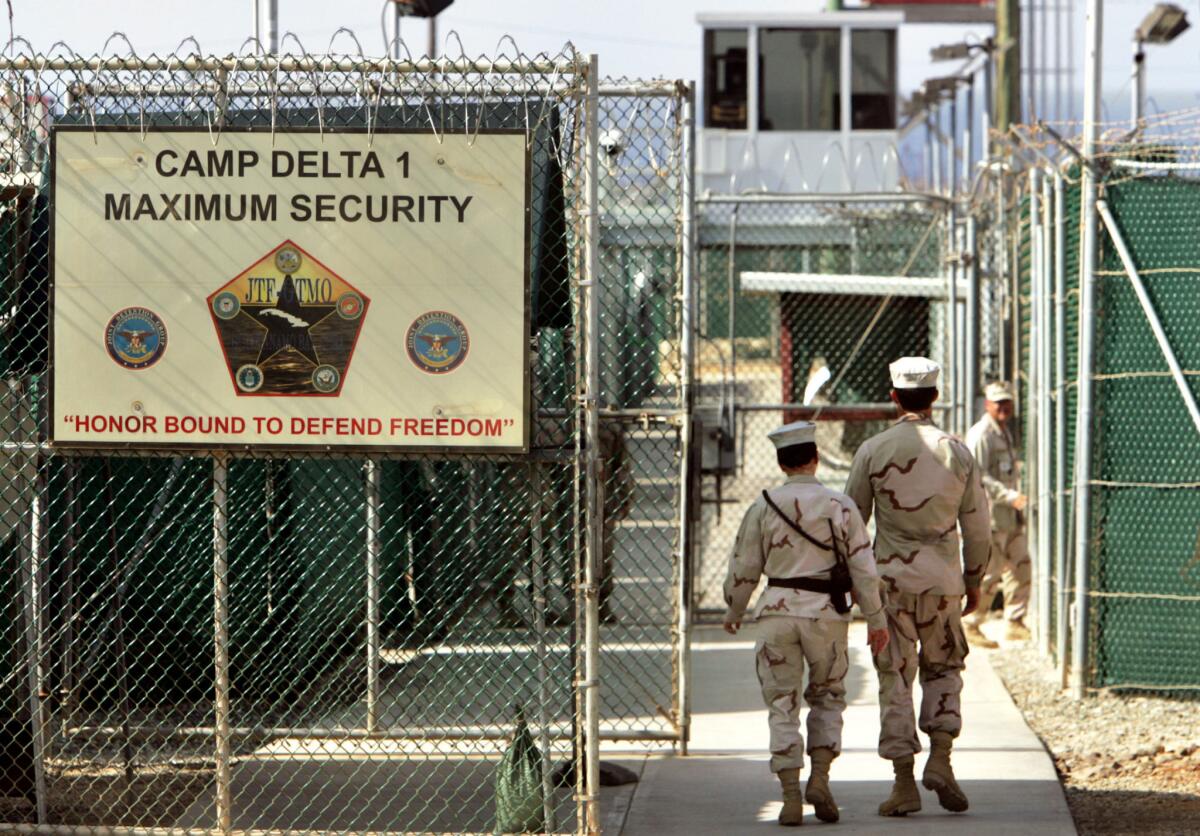Feinstein and Durbin: How to close Gitmo

- Share via
The detention facility on our military base at Guantanamo Bay, Cuba, is holding 166 individuals. Most of them have been there a decade or more.
Operating Guantanamo costs about $450 million a year — or about $2.7 million a detainee, according to the Defense Department. Consider this: It costs $78,000 to hold a convicted terrorist in the most secure federal prison in the United States, Supermax in Colorado. With the sequester stretching budgets and Defense Department employees under furloughs, the U.S. is spending, per Guantanamo detainee, roughly 35 times the amount it spends at Supermax detaining a convicted terrorist.
This is a massive misuse of taxpayer money.
Some of the 166 detainees are slated for trial, while 46 others, the administration says, will be held without trial until the war against terrorism is over, whenever that may be.
More than half — 86 — have been cleared for transfer by the Bush administration, the Obama administration or both. Nonetheless, they remain in indefinite detention and legal limbo.
The Obama administration announced in late July that two detainees who had been cleared for transfer for years would be sent back to their home country, Algeria. If the pace of these transfers does not dramatically increase, by the end of President Obama’s second term, the majority of Guantanamo detainees there today will have been held without trial for almost 15 years.
Guantanamo has devastated our reputation as a champion of human rights, weakened our international partnerships and remains a powerful recruiting tool for terrorists.
The hopelessness at Guantanamo led detainees to go on a hunger strike this year — more than 100 at its peak. Twice a day, military personnel force-feed them with a tube inserted through their noses. For some detainees, this has been going on for more than five months. This large-scale force-feeding violates international norms and medical ethics.
Military personnel at Guantanamo face challenging conditions but operate with professionalism and dedication. It is not our military that has failed; it is our policymakers.
Efforts by the administration to transfer or prosecute most of the remaining detainees have stalled, while a recalcitrant Congress has stymied even modest attempts to reduce the prison population.
This is unacceptable. The administration must create a program for transfer or trial for those who remain, so Guantanamo can be closed once and for all.
How should the 166 individuals at Guantanamo be handled?
First, Congress and the administration should expedite efforts to transfer the 86 detainees already cleared for transfer. This includes 30 non-Yemeni prisoners and 56 Yemenis. The president should exercise his authority to transfer the non-Yemeni detainees to other countries, where they could remain in custody. The 56 Yemenis could be sent to Yemen or Saudi Arabia, where those governments could hold them so they do not attack the U.S. or our allies.
The administration should finally begin the long-promised periodic review board hearings to evaluate the more than 70 detainees who have not been cleared for transfer. The board must permit detainees to challenge their continued detention, and over time, those who do not pose a threat should be transferred to other countries. The White House has submitted an outline of a plan for closing Guantanamo that stated that “the first two detainees receiving PRB hearings have been notified.” This is a positive step that we hope means the first hearings will start this month.
The 2014 Senate defense authorization bill will come up for debate on the Senate floor this fall. Congress must pass the provisions that streamline procedures for transferring detainees abroad and allow transfers to the U.S. for trial or detention under international law until the end of hostilities.
As chairwoman of the Senate Intelligence Committee and chairman of the defense appropriations subcommittee, respectively, we are committed to preventing terrorist attacks. We believe terrorists deserve swift and sure justice, and severe prison sentences. But holding detainees on an island off U.S. shores for years — without charge — is an abomination. It is not an effective administration of justice, does not serve our national security interests and is not consistent with our country’s history as a champion of human rights.
It is time to close Guantanamo.
Dianne Feinstein (D-Calif.) is chairwoman of the Senate Intelligence Committee. Dick Durbin (D-Ill.) is assistant majority leader of the Senate.
More to Read
A cure for the common opinion
Get thought-provoking perspectives with our weekly newsletter.
You may occasionally receive promotional content from the Los Angeles Times.









